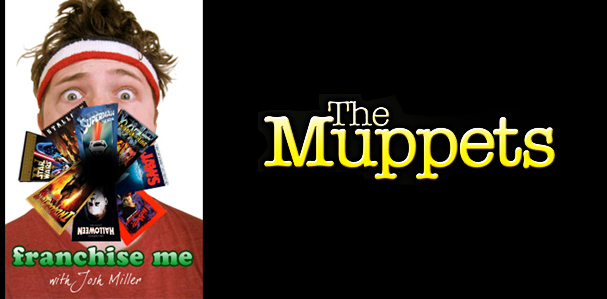
Hollywood loves a good franchise. The movie-going public does too. Horror, action, comedy, sci-fi, western, no genre is safe. And any film, no matter how seemingly stand-alone, conclusive, or inappropriate to sequel, could generate an expansive franchise. They are legion. We are surrounded. But a champion has risen from the rabble to defend us. Me. I have donned my sweats and taken up cinema’s gauntlet. Don’t try this at home. I am a professional.
Let’s be buddies on the Facebookz!
The Franchise: The Muppets — following the schtick-heavy misadventures of an eclectic race of puppet-like beings who thrive and survive amongst us in the regular human world. Birthed in the mid-1950’s by puppeteering super-champ Jim Henson for use in advertising commercials, the Muppet aesthetic/brand has since infiltrated every conceivable niche, medium and outlet imaginable, including television, music albums, motion pictures, video games, comic books, view finder stories, and literature. Since I imagine some may be disappointed to learn that I won’t be covering The Muppet Show, I figure an explanation is due… The reason is twofold: 1) While The Muppet Show is obviously where Henson’s Muppet creations solidified into the form we think of when we hear “the Muppets,” it was really just the culmination point of Henson’s success story; several of the central Muppets, like Kermit, Rolph and Gonzo, had already existed for many years by that point, as had the word “Muppet” to describe them. And more importantly, 2) TV is a can o’ worms. Why include that show and not Sam and Friends, Sesame Street, The Jim Henson Hour, Muppet Babies, Little Muppet Monsters, Muppets Tonight, etc, etc? And then there are the crazy number of TV movies and specials. It defeats the entire purpose of this column for me to pick and choose installments based on what I think is “good” or “relevant.” It is easier and frankly I think more interesting to boil the franchise down to something that is readily discussable — like the Muppets’ ventures onto the big screen. So, for the sake of tidiness, I will be battling the six theatrical feature films, plus the forthcoming The Muppets relaunch.
previous installments:
The Muppet Movie
The Great Muppet Caper
The Muppets Take Manhattan
The Muppet Christmas Carol
Muppet Treasure Island
Muppets from Space
The Installment: The Muppets (2011)

The Story:
We open with a first-person narration by Walter, tracking his life from childhood to the present. Walter is a Muppet. His best-friend and brother Gary (Jason Segel) is a human. As Walter got older, this difference became more acute, given that Gary eventually became 6’4 and Walter never grew an inch. But Walter had an escape: The Muppet Show. He felt a kinship with Kermit and the gang, and became their ultimate fanboy. Despite their size difference, Gary and Walter have remained inseparable besties. So inseparable that Gary invites Walter along for his tenth anniversary vacation with Mary (Amy Adams) in Los Angeles — where the Muppet Studio is. Mary is of course not overjoyed by this. Once in LA, Walter is dismayed to discover that the Muppet Studio hasn’t been active for years, now existing solely as a rundown tourist trap. While sneaking around the lot, Walter overhears a crafty businessman, Tex Richman (Chris Cooper), talking about his plans to tear down the Muppet Studio to drill for oil — unless the Muppets can raise $10 million, that is. Walter, Gary and Mary immediately seek out Kermit and convince him to get the gang back together for a big show. Complicating matters is the strained relationship between Kermit and Miss Piggy. And the increasingly strained relationship between Gary and Mary. And soon the strained relationship between Walter and Gary, as Walter finds himself drawn into the Muppet world.
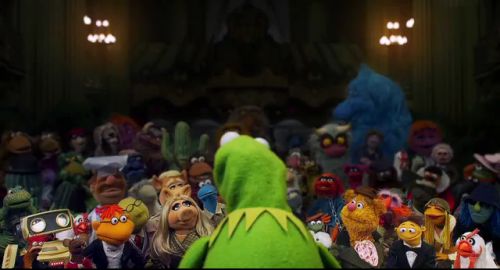
What Works:
Outwardly The Muppets has a lot working against it. Muppets from Space resoundingly killed the theatrical franchise in 1999. And since Disney officially bought the characters in 2004 the Muppets have seemed an even shadowier shadow of their former selves (The Muppets’ Wizard of Oz, anyone?). Inside the Henson Company, things get even sketchier. The classic Muppeteer line-up was Jim Henson, Frank Oz, Richard Hunt, Jerry Nelson, and Dave Goelz. There were always other Muppeteers, but the ‘Big 5’ made up the vast majority of Muppet characters — they respectively comprised the five-member Electric Mayhem, for example. Henson and Hunt died in the early 90’s. Since the Disney take-over Nelson has retired from his Muppet Show characters, and Frank Oz has recently done the same due to age and creative differences with Disney (Oz had a Muppet script he wanted to direct that never got off the ground). That leaves just Dave Goelz. Which means that of the classic Muppet characters, now only Gonzo, Dr. Bunsen Honeydew, Beauregard, and Zoot (of the Electric Mayhem) retain their original voices. On top of all this, The Muppets was spear-headed by two guys who aren’t members of the Henson Company, who aren’t puppeteers, and who weren’t even alive when The Muppet Show premiered in 1976. Yet, this may in fact be the key to why The Muppets works so successfully. Screenwriters Jason Segel and Nick Stoller were able to cut through the bullshit, the Henson Company’s personal baggage that (I think) got in the way of the bigger picture back in the 90’s.
It was heartfelt, respectful, deserved, however you might put it, to acknowledge the irreplaceable passing of Jim Henson and Richard Hunt by essentially not replacing them — by downgrading Kermit and retiring Rowlf, Dr. Teeth, Scooter, and Janice. But the farther we got from the real-life context of those decisions (as in, say, some handsome fellow watching the franchise in November of 2011), the less relevant they feel. I also think there was something disingenuous about continuing to use the Rowlf, Dr. Teeth, Scooter, and Janice puppets, while simply leaving them mute. This isn’t a cartoon. The same person doing the voice was providing movement to the character. It was a two-step performance. If Henson and Hunt were replaceable as puppeteers, they were replaceable as voice actors too. Statler and Waldorf now represent a great example of how things should’ve been done. There was no change to these characters or their usage after Henson and Hunt died, other than their voices. Viewing the previous six films in hindsight, they’re probably the most consistent major characters in the whole franchise, as both Fozzie and Piggy’s importance were sadly altered because of their previous deep ties to Kermit. Segel, Stoller and director James Bobin are not concerned with respecting Henson or Hunt or whoever. They’re concerned with respecting the characters, which, in the end, is the best way to respect the characters’ creators.
Segel, Stoller and Bobin fucking nailed this franchise. Nailed it hard. It’s gonna be walking funny for a couple days. Above all else, and on its own terms, The Muppets is a wonderful film, a big bear-hug of deadly sincere positivity and heart that somehow never threatens to get saccharine. Nevertheless, the film is undeniably going to hit home the hardest with existing Muppet fans. And that’s what we’re here to talk about. Outwardly The Muppets is something of a Halloween H20, seeming to ignore a big chunk of the recent franchise to “restore” the series to its roots. Those who grew up during the 90’s Gonzo-era, as one might call it, may have sour feelings about seeing Gonzo restored to his previous position in the collective; doubly so for fans of the Gonzo-Rizzo duo. I don’t want to dismiss this outright, as even though their initial pairing was unnaturally forced, they did develop a legit fan following afterwards. But the duo inevitably had to die, because they were the figurehead of a misguided approach to the franchise, of decisions made for reasons having nothing to do with creativity or the characters and everything to do with now-irrelevant real-world reactions. But the 90’s aren’t being ignored. The Muppets is an accumulation of all that came before it. Hell, Bobo the Bear returns in essentially the exact same role he had in Muppets from Space, here playing Tex Richman’s affable sidekick. There are nods and callbacks to several of the previous films, like Bobo singing a couple lines of Manhattan‘s “Together Again,” or the fact that the entire plot hinges on an important clause in the “standard rich and famous” contract that the Muppets signed with Orson Welles in The Muppet Movie. But overall, what The Muppets is doing conceptually is skipping back past all the films, straight back to The Muppet Show.
Somewhat amazingly, this is the first film to feature The Muppet Show “Theme Song,” or acknowledge the TV series directly. This is something that only the passage of time can make feel special. If The Muppet Movie had been about the TV show, it would have been uninteresting in 1979. But now, for old school fans, the Muppet Show callbacks are probably the film’s most successful franchise in-jokes — from small bits, like Walter’s Kermit impression (an impression of something Kermit only did on the TV show), to the unexpected promotion of the minor and completely forgotten Uncle Deadly (aka Muppet Theater Phantom), who here plays a pivotal role as Richman’s existentially troubled second sidekick. Segel and Stoller are able to use The Muppet Show as a powerful double-edged sword, as both a neat tool to introduce a new audience to the characters’ full background and also to beat the ever-loving shit out of fans’ nostalgia cores. Not to make this about me, but I got misty-eyed when the Muppets performed the “Theme Song.” And I don’t even think it was supposed to be emotional! Speaking of nostalgia…
As much as we cinefiles try (or at least pretend) to rise above it, a huge percentage of all our opinions are tainted by what we were exposed to during our formative years. Your grandparents thought your parents’ music was noise, your parents thought yours was noise, you think your kids’ music is noise, and so on down the line. The pop culture circle of life. As Grandpa Simpson sagely warned: “I used to be with it, but then they changed what it was. Now what I’m with isn’t it, and what’s it seems weird and scary to me. And it’ll happen to you too!” Which is just my roundabout way of saying that, while context is invaluable, nothing fouls up critical analysis like unchecked nostalgia. It amazes me that there are reviews of The Muppets in which it is penalized because “Kermit doesn’t sound right.” That is moronic. Henson didn’t want the Muppets buried with him. More films were made, and they must be judged on their own terms, otherwise what’s even the point in talking about them? Everything else is just fanboy wank vapor. I gave the 90’s films guff for downgrading Kermit, not because I loved the character so much (Animal and Beaker were my favs as a kid), or because that’s how the Muppets are supposed to be, but because the character doesn’t work well tossed in with the rabble, and because he was sidelined for creatively irrelevant reasons (the character hadn’t become less popular or evolved to that position). Plus, pushing Kermit aside from his central position was making room for human protagonists.
At first glance it seems like The Muppets learned nothing from past mistakes. Kermit still isn’t the lead, and fucking shit, there’s Jason Segel and Amy Adams all over the posters! Damn humans! But Segel and Stoller – whether intentionally or by dumb luck – sneaked in a rather perfect character structure for the Muppets in 2011. There is something just so Muppety about acknowledging that the Muppets went away. Sure, this story could have been told from Kermit’s perspective, but pragmatically speaking, the world just doesn’t care about Kermit like they used to; I mean, his own franchise was slowly burying him. Kermit, like the franchise, needed a booster shot; audiences new and old needed to be reminded that he wasn’t some empty-shell franchise-face like Mickey Mouse. We need some hero-building. The savviest way to do that is to see Kermit from the eyes of a worshiper: Walter. And to refine what I’ve said in previous posts — while I think the ideal Muppet film has Kermit as the protagonist, that is of lesser importance than him simply being correctly, as the central Muppet. The film’s larger story is seen from Walter’s perspective, but the putting-the-band-back-together Muppet sub-story is entirely from Kermit’s perspective. That’s why it works! We’ve returned to the classic, tried and true inter-Muppets dynamics.
Not that it really matters, but for those who can’t get past the characters not sounding “right,” all the replacement voice-work has radically improvement since Space (likely just from eleven years of practice). Steve Whitmire’s Kermit sounds great, moves great, and as much as I love Frank Oz, I truthfully had no idea he wasn’t involved with The Muppets until after I first saw the film. Even on the second viewing I had to strain to pick up on it. Eric Jacobson, who took over all of Oz’s characters, does a mean Frank Oz. His Fozzie is especially on the nose.
Walter. Just by looking at him Walter seems something of a conceptual disaster. There have been numerous “human” Muppets in the past, but none have ever risen higher in importance than Statler and Waldorf. Now we have this guy as our hero? But Walter is pretty delightful. It remains to be seen how he’ll perform as “just one of the gang” in future installments (remember, that’s what killed Kermit; characters designed to be protagonists usually don’t make great supporting characters), but within the context of The Muppets Walter is a welcome and needed addition. From a Muppet perspective he reeks of “new blood,” in a good way. Peter Linz had performed for a few Henson Company kids TV programs, but is a newcomer to the proper Muppet franchise. So he sounds distinctive. And his boring look is only boring in still image form. Walter’s movements are fab. The face he’s making during his prolonged, montage scream (after overhearing Tex Richman’s nefarious plan) is pure Muppet gold. Walter also adds a bit to the, uh, I guess we’d call it mythology? The Muppet franchise has never had much of a mythology, as the characters’ backstories keep changing (I kind of assume Gonzo isn’t even an alien anymore), but one thing that has remained steadfast is that the Muppets aren’t puppets. We don’t really know what the fuck they are. Within the context of the films, they are what they seem to be — Kermit is a talking frog, Piggy is a talking pig, and Walter is a human. People see Walter as short, but other than that we are never given any reason to assume that Walter didn’t pop out of the exact same vagina as Gary. What is kooky about the film’s story is that one might think that Walter feels out of place cause he looks like he’s made of felt, so upon seeing The Muppet Show on TV he’d say, “Those guys look like me!” But that isn’t what happens at all. The Muppets aren’t drawn together because they’re all weird puppet-beings. They’re drawn together by their love of performance — The Muppets continues with the autobiographical metaphor that was present in The Muppet Movie. Walter is drawn to The Muppet Show in the exact same way that Jason Segel was, that any Muppet superfan was/is. Walter becomes a Muppet by joining their ranks, not because it is the only place he belongs ethnically. Gary also goes through an existential crisis over whether or not he is a Muppet too; both men make a decision on whether they are a men or Muppets. It seems almost extraneous, but I think this is possibly the most important Muppet “rule.” The moment they start making jokes about the Muppets looking like puppets, or worse, being puppets, it all goes down the drain.
Though Gary encroaches on Walter’s protagonist status a bit too often, because their relationship as an inseparable duo is a key part to Walter’s story, having a human placed so prominently front and center doesn’t feel like as much of a problem as it was in Carol and Treasure. Gonzo and Rizzo helped diffuse our human hero in Treasure, but they themselves had no stories whatsoever, they were just comedic accessories for Jim Hawkins. Even if we view Walter and Gary as equal heroes, the narrative nonetheless opens and closes with Walter’s journey. Gary’s arc is learning to let Walter go; Walter’s arc is finding his place in the world. That makes Walter the emotional center of the film, regardless of screen time. More importantly though, unlike Jim Hawkins or Scrooge, Gary and Mary are funny.
The music. The music! The Muppets has the best soundtrack since The Muppet Movie. James Bobin does a bang-up, sure-handed job directing the film, but the sexiest thing he did for the project was bring his Flight of the Conchords cohort Bret McKenzie on board. I honestly don’t mean any offense to Bobin, but I think there are numerous directors who could have delivered the film at the same level he did. I’m not sure anyone aside for McKenzie could have done the same for the soundtrack. Like Paul Williams’ tunes for the first film, McKenzie’s work here squarely hits the sweet spot between contemporary music and showtunes, while bouncing around stylistically from subgenre to subgenre. McKenzie’s own sensibilities work truly perfectly for the Muppets, as the ideal Muppet song doesn’t just have funny lyrics, but is kind of its own joke in itself (an angle at which McKenzie even trumps Williams). From small touches like Jason Segel providing his own echo on “Man or Muppet” to the entirety of Chris Cooper jaw-droppingly out of no where rap number, “Let’s Talk About Me.” The Moopets’ (the Muppets cover band that Fozzie fronts in Reno) mangling of “Rainbow Connection,” with lyrics all promoting aspects of the casino in which they perform, is comedy gold. I fully expect “Me Party,” Amy Adams and Miss Piggy’s faux-empowerment duet, to take on a life of its own in the future, becoming an ironic anthem for singles everywhere. And speaking of my own misty-eyed moments, “Pictures in My Head,” the number in which Kermit is wistfully remembering the other Muppets while gazing at their portraits, is a touching and unique way to reintroduce several of our characters — a perfect example of a scene that smartly serves the double purpose of hyping the characters for a new audience while nostalgia-skull-fucking the rest of us old bastards. And don’t even get me started on the moment when the Muppets redo “Rainbow Connection.” So good. Oddly, I’ve heard some people complain about the movie’s inclusion of non-original songs. Six new original songs isn’t enough for you people? Anyway, aside from one example, the non-original songs all come in the context of the Muppets telethon show, which is entirely in keeping with The Muppet Show, where the Muppets mostly did covers of popular songs. Besides, if you’re not laughing during the barbershop quartet version of “Smells Like Teen Spirit,” you probably shouldn’t be wasting your time watching a Muppet movie in the first place.
Muppets from Space felt like it was straining to be a feature-length movie, a franchise out of ideas and steam. The Muppets feels like it is being constrained, bursting with energy and jokes and struggling as hard as it can to fit in bits for all our established characters (some will be sad to see so little of Pepe, though his one bit is a winner). I can’t begin to single out all the elements that make this movie great, or we’ll be here forever. Zach Galifianakis’ Hobo Joe. The Moopets (Evil Fozzie’s gansta “wacka wacka” just destroys me, for whatever reason). Kermit having no idea who Modern Family‘s Rico Rodriguez is, and Rodriguez similarly wondering if Kermit is a Teenage Mutant Ninja Turtle (a nice jab at the Muppets’ lack of relevancy to 2011’s children). Gonzo having a button he can push to destroy his plumbing-supply empire with a giant explosion. Amy Adams’ section of “Life’s a Happy Song”; Piggy ashamed to be fooled by the idiotic ‘Muppet Man’ ruse; Jack Black actually being used correctly; my favorite new character in the movie, 80’s Robot, whose every moment is a dumb-joke masterpiece – “Groddy to the max!”, a tray of New Coke and Tab, an AOL dial-up joke; gold after gold after gold. 80’s Robot is the gift that keeps on giving. And these are just the funny moments. The movie has so much heart too, it is disgusting. The scene in which the Muppets are all sleeping in hammocks in their rundown theater, and Fozzie, clutching his ole teddy bear, nervously asks Kermit if they will be okay? Fuck me, I’m getting misty-eyed just typing this. [Edit: I got misty-eyed again proof reading this! What the fuck!?!]
Chris Cooper. Sorry Grodin and Durning. I think we have a new champ for best Muppet movie villain performance. Whereas Grodin got laughs by completely detaching from reality, the power of Tex Richman is the complete dedication with which Cooper tackles his ridiculous dialogue. He isn’t winking to us when Richman says “maniacal laugh” repeatedly instead of actually laughing maniacally. He put as much stock into that ridiculous line as he did with anything in Adaptation. I was not emotionally prepared for his rap song either, which he also approaches with zero irony, making it all the funnier. “Let’s Talk About Me” is probably the funniest part of the movie, if we’re breaking things down to length of sustained laughter. (I highly recommend people check out the full version of the song on the soundtrack album.) Cooper’s Tex Richman also represents the most interesting meta aspect of the movie, one that likely wasn’t even intentional. I couldn’t help but view Richman as Disney, especially once the subplot of Richman now owning the Muppets’ name (and whoring it out for whatever) was introduced. Disney obviously never cared about the Muppets. It was a business decision — they wanted the “oil” underneath the Muppets franchise. The fact that The Muppets is a comeback venture just like the Muppets telethon in the film makes this parallel all the more acute. Obviously Disney won’t give the Muppet back to the Henson Company if the film makes $10 million, but if The Muppets succeeds at the box office, the Muppets will be allowed to do their thing for a while longer. If not? We probably have some Moopets-quality shit to look forward to in the future. Segel, Stoller and Bobin are effectively the Muppets in this scenario, trying to re-validate the property before Disney gets bored and mines the franchise for parts.
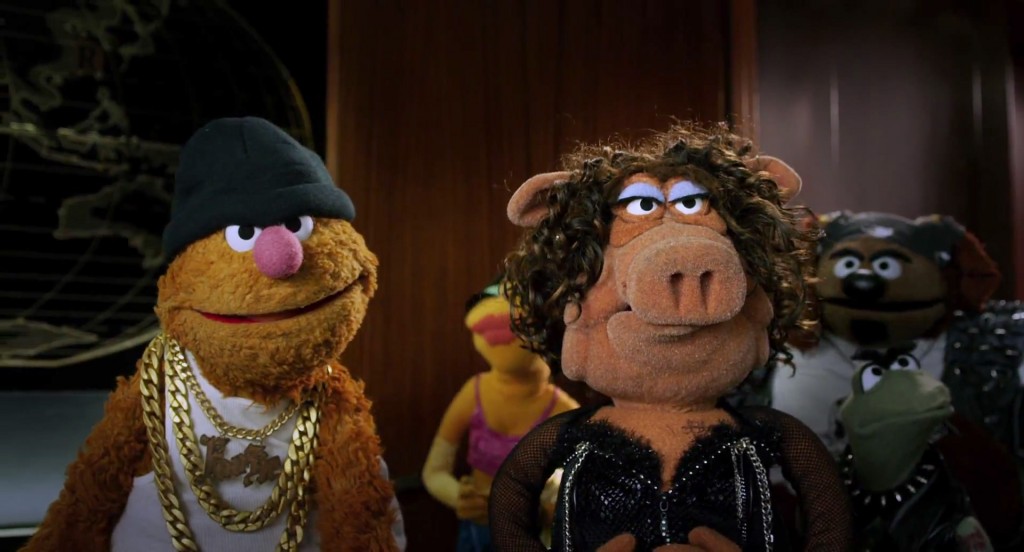
What Doesn’t Work:
My only musical complaint for the film is that we don’t get an Electric Mayhem tune. I liked the use of covers during the telethon, but was disappointed that Starship’s “We Built This City” was used during the scene where the Muppets fix up the Muppet Theater. This would’ve been a perfect place for an original song… an Electric Mayhem song!
It is a testament to the overall quality of the film that it manages to get away with some clunky structural stuff. For example, the film opens with a narration by/about Walter. Walter is our hero, and to a lesser extent Gary and Mary. But midway through the film Kermit takes over until near the very end when Walter jumps back behind the wheel. This is a lesser of two evils, of course, because had they not done this I would complain about not getting enough Kermit. I’m glad they did it this way, but it nonetheless lessens the impact of Walter’s arc. I was 100% invested in Walter during Act I, but by the end I didn’t care as much. Another aspect of this is Walter’s climactic moment, his whistling number that closes out the telethon, which is something of a dud for two reasons: 1) it isn’t properly set-up. Walter is seen whistling in a couple scenes earlier in the film, and if you want to get really motif-tastic, the film opens with Paul Simon’s “Me and Julio Down by the Schoolyard,” which features one of pop music’s more familiar whistling sections. But considering that this is Walter’s moment of triumph, it still feels underdeveloped. More importantly though, 2) it isn’t that cool. If you saw someone whistle like that in real-life, sure, but this is a movie, a movie that had up until now featured some hilarious and catchy musical numbers. Walter’s whistle number is cute, but the fact that it is such a lesser moment just goes to prove that Walter has become a second-class protagonist by the end. His “pay-off” is something of a throwaway afterthought — perfectly fine for the overall film, but rather blah for our hero. I should probably also talk about Gary and Mary’s subplot distracting from Walter’s story and taking time away from Muppets, but “Me Party” and “Man or Muppet” honestly make every one of their human digressions completely worth it for me.
Animal’s subplot is something of a sly cheat. Unable to play the drums because of court-ordered anger management, initially the Electric Mayhem is unable to properly get into a groove because they’re lacking their wildman drummer. This naturally builds up to the moment when Animal finally unleashes the beast during “Rainbow Connection” and lets loose on the drums. Once again (cause I’m a total pussy apparently) I got misty-eyed when this happens. But that’s my dumb heart talking. My cold brain called “bullshit.” The story necessitated that the Electric Mayhem perform every single song during the telethon to excellent effect prior to the big “Rainbow Connection” number, which should invalidate the impact of Animal’s big moment. It doesn’t, cause we’re invested in the movie already, and we already love Animal. But it shouldn’t work. So I say bullshit, The Muppets! Cheaters!
Rumor has it that numerous big celebs like George Clooney were edited out of the film. Whatever the case, while The Muppets returns to The Muppet Movie glory, its cameos feel decidedly Muppets from Space. Big actors like Jack Black and legends like Mickey Rooney (whose career now spans ten decades for those paying attention; ten decades) are on the money, but the glut of cameos featured during the telethon is too TV oriented and underwhelming. This in no way affects the quality of the overall film, but given that cameos have been a big part of the franchise, I had to mention it.
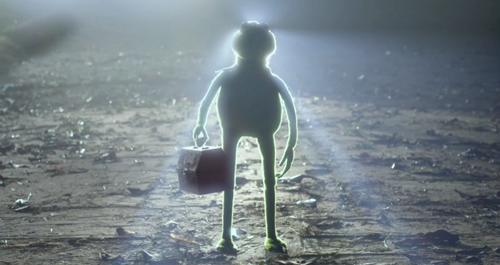
Celebrity Cameo Count: 19
Best Celebrity Cameo: The Big Bang Theory‘s Jim Parsons as Walter’s human form during “Man or Muppet.”
Best Pun: When Fozzie’s portrait comes alive during “Pictures in My Head.”
Fozzie: I didn’t do it. I’ve been framed.
Worst (aka Best) Fozzie Joke: “Once you’ve seen one shopping center, you’ve seen a mall.”
Most Ridiculous/Bizarre Joke: Cooper’s “maniacal laugh, maniacal laugh” character quirk.
Best Meta Moment/Line: After Kermit says it is impossible to reunite the Muppets.
Mary: This is going to be a short movie.
Joke No Child Could Understand: When TV exec Veronica Martin (Rashida Jones) says she’d rather put Benson on during the Muppets’ time slot. Probably a lot of adults don’t even remember that show.
Sadly Under-Featured Muppet: The Electric Mayhem!
Should There Be a Sequel: Fuck. Yes.
Franchise Assessment:
The Muppets is a fabulous franchise. Unlike the previous franchises I’ve tackled here, even at its worst, the Muppets are still good. I think only Toy Story rivals the Muppets as a group collective. And Kermit the Frog is one of the greatest all-audience center piece characters the world has ever seen. More flawed and interesting than Mickey Mouse. More relatable than Bugs Bunny, Homer Simpson or Spongebob. More human than Uncle Scrooge or Indian Jones. It is almost hard to pinpoint what exactly is so wonderful about the character. Jim Henson most certainly blew magic into that assemblage of felt, but as The Muppets demonstrates, the character continues to live on without Henson (and had even during his lifetime on Muppet Babies).
Though I think the 90’s represent a grand misstep in the franchise, the upside is that they stretched things out without actually doing any permanent damage (unless it just really chaps your hide that Gonzo is an alien). So, the precedent has been set — the Muppets can really be used for anything now. If we can do away with the human protagonists, and have confidence enough in Kermit once again to play lead, I’d even welcome some fun literary adaptations.
Franchise ranked from best to worst:
[Based on my current feelings I would actually place The Muppets right up there with The Muppet Movie and Caper, but one of the key attributes to a “classic” is withstanding the test of time. Which The Muppets has yet to do.]
The Muppet Movie / The Great Muppet Caper
The Muppets
Muppets Take Manhattan / Muppet Treasure Island
Muppet Christmas Carol
Muppets from Space
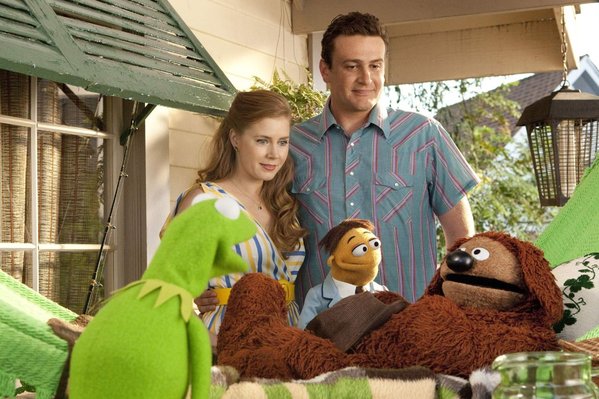
Up Next: Home Alone! It’s Xmas time, motherfuckers!
DISCUSS THE FRANCHISE ON THE BOARDS
previous franchises battled
Critters
Death Wish
Hellraiser
Leprechaun
Phantasm
Planet of the Apes
Police Academy
Rambo
Tremors